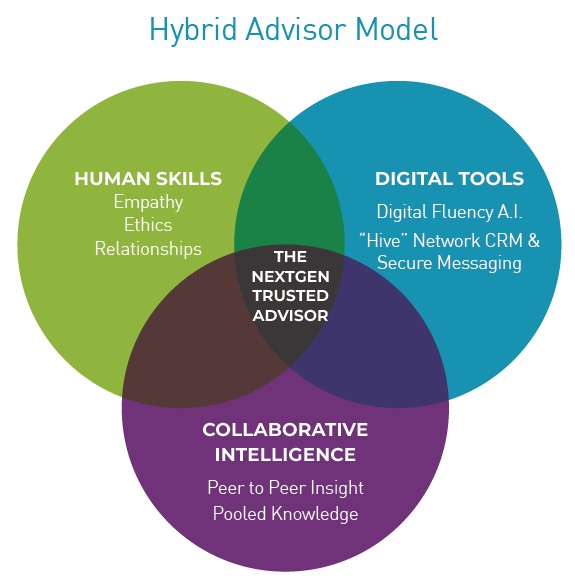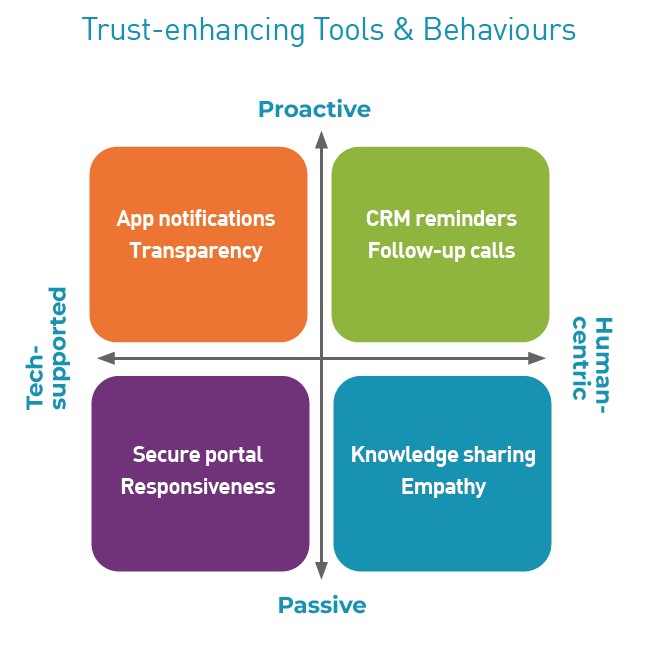Our latest AGN Global Business Voice (GBV) publication, Redefining the Trusted Advisor in Accounting, examines how evolving client expectations, technological change, and strategic insight are transforming what it means to be a trusted advisor today.
Audio bite.
Introduction
We’ve been saying it for years…”AI might automate much of what an accountant does, but it can’t replace the human relationship, the empathy and trust that come from the close adviser…”. Indeed the role of the trusted advisor in accounting is not vanishing — it is evolving into something more powerful. Clients across generations still seek trust, empathy, and competence. But the way these qualities are expressed is shifting dramatically:
- Digital fluency, not just longevity, defines credibility.
- Empathy and ethical judgment are increasingly crucial differentiators.
- Trust is built both through tech-enabled convenience and intentional human connection.
- Collaborative intelligence (or “hive mind” networks) may be the next frontier in high-value advisory work.

On the move?
Tune into our mini podcast on Spotify at the end of this article for a quick summary of the key insights.
As automation accelerates, it frees up human advisors to play a more strategic and emotionally
intelligent role. The winning formula will be tech + touch — where efficiency and empathy combine to
create consistent, proactive value for clients.
Practical Actions for AGN Member Firms:
1. Redefine the Advisor Role – Make it clear to clients (and your staff) that the firm’s value isn’t in data entry but in interpretation, insight, and ethical guidance.
2. Review the AGN Advisory Migration Methodology – Engage your colleagues in the process by using the AGN Advisory Migration Diagnostic tool across your management team. Test the appetite for an AGN bespoke workshop for your firm.
3. Emotional Intelligence for an International audience – Develop soft skills like active listening, reading tone in digital communication, and handling difficult conversations with care.
4. Build Personal Brands – Encourage staff to publish, speak, or engage on platforms where clients can find and trust them as individuals.
5. Invest in Digital Tools That Enhance Trust – CRMs, secure messaging, and predictive analytics support responsiveness and transparency.
6. Establish Hybrid Communication Norms – Use Zoom, video messages, and periodic in-person meetings to build lasting relationships.
7. Introduce Collaborative Insight Networks – Explore peer forums or internal platforms where advisors can share anonymised client challenges for broader thinking.
8. Reassure with Accountability – Be transparent about the use of AI tools and ensure that clients know the human advisor is still the one in charge.
9. Create Virtual Shadowing Paths – Let junior staff listen to calls, observe tone and delivery, and learn the human aspects of advisory.
10. Monitor & Manage Online Reviews – Cultivate testimonials and client feedback to strengthen digital trust signals.
11. Celebrate Integrity – Regularly reinforce ethical behaviour and remind staff that trust is built not only on what you know, but how you show up.
Overview: A Changing Trust Landscape
| Generation | Preferred Trust Signals | Communication Style |
|---|---|---|
| Boomers | Tenure, face-to-face relationships | Phone, in-person |
| Gen X | Competence, reliability | Email + in-person |
| Millennials | Responsiveness, values alignment | Email, text, video meetings |
| Gen Z | Empathy, digital fluency, authenticity | Chat, apps, asynchronous video |
Clients of different generations still value trust — but define and experience it differently. Boomers may seek frequent in-person updates. Gen Z prefers transparent dashboards, fast responses, and smart, empathetic digital interactions.
Trust in automation is limited. While AI and automation tools now generate reports and flag issues, clients still seek a human voice to interpret the results, validate direction, and empathise with the stakes. Advisors become curators of technology — combining speed and accuracy with empathy and judgment.
1. From Periodic to Continuous Advice
Thanks to automation and alerts, the advisor can now be ever-present — watching trends, flagging risks, and offering micro-advice. It’s a shift from once-a-year updates to real-time engagement.
2. From Periodic to Continuous Advice
With automation commoditising compliance tasks, the trusted advisor is increasingly expected to help interpret meaning and guide decision-making. The advisor becomes a thought partner.
3. From Tenure to Tech-Enabled Credibility
As automation and AI tools become central to the advisor’s toolkit, traditional certifications and qualifications, while still important, may start to lose their exclusive status as markers of trust. Increasingly, clients value advisors who can leverage technology to deliver timely, tailored insights and demonstrate up-to-date digital fluency, rather than relying solely on longstanding credentials.
4. From Transactional to Empathetic Service
Trust is emotional. Empathetic communication, awareness of life context, and personal follow-ups matter more than polish. Advisors who anticipate and care, outperform those who just deliver.
Overview: A Changing Trust Landscape
The client journey in a modern and hybrid accounting firm is no longer a linear sequence of compliance tasks. Instead, it’s a dynamic blend of automated processes and human interaction — where AI handles speed, scale, and standardisation, and the advisor steps in with empathy.
| 1. Onboarding – Where trust begins – Digital touchpoint: E-signatures, identity verification, secure portals. – Human overlay: Welcome call/video meeting, explanation of processes, demonstration of digital tools. | Impact of AI/Automation Chatbots may triage FAQs, onboarding workflows are streamlined through AI, but a human touch builds trust from day one. |
| 2. Data Intake – Capturing financial data accurately and efficiently – Digital tools: Bank feeds, expense apps, document upload tools (Dext, Hubdoc, AutoEntry). – Human overlay: Staff review for anomalies or coaching clients on correct usage. | AI role: Smart systems auto-tag transactions, flag missing fields, and clean data. This frees staff to guide clients, not chase paperwork. |
| 3. Automated Insights – Fast, consistent, data-driven signals – Digital tools: Dashboards, alerts, predictive models. – AI contribution: Cash flow projections, benchmarking, KPI trends, variance analysis. | Trust challenge: Clients may not act on these insights without context. Automation delivers signals, not decisions. |
| 4. Human Interpretation – Making sense of the data with context and empathy – Advisor actions: Explain dashboard results, contextualise changes, validate AI forecasts. – Client experience: “They know what matters to me. They listen and guide.” | Key value-add: This is where trust deepens. The advisor translates tech into strategic meaning — something no AI can replicate yet. |
| 5. Strategic Advice – Collaboration beyond compliance – Hybrid delivery: Zoom planning sessions, scenario modelling tools, shared digital whiteboards. – Advisor role: Align financial signals with business or life strategy, assess risk appetite. | AI role: Simulates options, not decisions. The human advisor adds wisdom, ethics, and client-specific judgment. |
| 6. Relationship Touchpoints – Reinforcing trust through ongoing communication – Automated nudges: Birthday emails, quarterly tax reminders, budget alerts. – Human follow-ups: Annual in-person meeting, spontaneous “just checking in” call, empathy-led outreach in tough times. | Balance: AI can prompt when to engage, but it’s the advisor’s presence and personality that retain the client. |
Key Example:
NextGen’s choice of Cybersecurity—despite its low synergy and high skills demand—shows an instinct to disrupt and differentiate. NowGen’s selection of Tax Strategy, a trusted revenue generator, reveals a focus on familiar disciplines and scalability.
Human Touch in a Tech-Driven World
Automation allows accounting firms to reduce costs and increase speed — but this isn’t the whole picture. Clients still want:
- Explanations in plain English.
- Responsiveness, even via chat.
- Insight personalised to their business or life goals.
Building Trust in Hybrid Work
Remote work has introduced new challenges in
relationship-building and training. But it also creates
opportunity:
- Virtual coffee chats can mimic informal rapport.
- Camera-on video calls improve understanding.
- Mentorship via scheduled virtual shadowing
ensures junior staff still absorb the “how” of
trusted advisory.
AGN firms that blend remote efficiency with periodic in-person rapport will have the edge.
Advisors who master the art of emotional intelligence —and use tech to enhance it — will continue to stand out. For example:
- Use CRMs to recall client birthdays, values, or milestones.
- Use screen-sharing to explain a tax forecast.
- Send a video message instead of a dense email.
Social Proof and Personal Reputation
The future of trust may be less about firm logos and
more about personal reputation. Online reviews, peer
recommendations, and visible empathy are powerful
trust signals — especially for Gen Z and Millennial
clients. Advisors should:
- Curate LinkedIn profiles with thought pieces.
- Ask for client testimonials.
- Share anonymised insights that showcase
approachability and value.
In addition, the increasing prevalence of online feedback platforms means that advisors must pay close attention to digital reviews and client comments. Proactively seeking and responding to feedback not only enhances visibility but also demonstrates a commitment to continuous improvement and transparency. These visible endorsements can significantly influence prospects’ perceptions and help build a strong, reputable online presence, particularly as clients increasingly rely on digital word-of-mouth when choosing advisors.

From Lone Expert to Hive Collaborator
Tomorrow’s most trusted advisors may be those who say, “I checked this approach with our expert
network.” Peer platforms — anonymised, secure, and topic-routed — could allow AGN advisors to:
- Query global colleagues for precedent or alternative solutions.
- Share collective insight with clients, increasing confidence.
- Tap into the wisdom of a group beyond their own desk.
It’s the next evolution of collaborative trust and AGN members are uniquely positioned to lead. AGN is strategically positioned to facilitate such a mechanism on an international basis. The ‘Hive’ mind approach is perhaps the AGN (North America) ‘Technical Resource Centre’ – turbo charged with AI, and taken global. Perhaps the challenge for AGN (and other similar organisations) is to correctly anticipate the emerging areas of required technical collaboration, and rapidly source and install adequate (Hive mind) software mechanisms in order to bring the communities of experts together. After all – who is better positioned to do this? No one single member that’s for sure.
Final Word
The future trusted advisor is not a solo act. It’s a hybrid professional: fluent in data, grounded in ethics, digitally agile, emotionally wise, and supported by a global community. AGN firms that develop and celebrate these qualities will deepen trust, loyalty, and relevance — no matter what the future brings.
Useful AGN Reference Materials:
- The Future of Accounting – Insights from AGN NextGenners
- The Pace of Digital Transformation vs Client Readiness
- Evaluating AGN Member Digital Maturity
- The AGN Digital Maturity Diagnostic Tool
- Unleashing the Power of ChatGPT
Mini podcast
Tune into our mini podcast on Spotify for a quick summary of the key insights.
For further information on this topic or anything relating to the AGN International Association of Accounting and Advisory Firms or to become an AGN member, please email your closest AGN Regional Director (see below) or go directly to www.agn.org.
Malcolm Ward
CEO AGN International
mward@agn.org
Jean Xu
AP Regional Manager
jxu@agn.org
Marlijn Lawson
EMEA Regional Director
mlawson@agn.org
Cindy Frey CPA, CGMA
Americas Regional Director
cfrey@agn.org
Copyright © 2025 AGN International Ltd. All rights reserved. No part of this publication may be reproduced, distributed, or transmitted by non-members without prior permission of AGN International Ltd.




